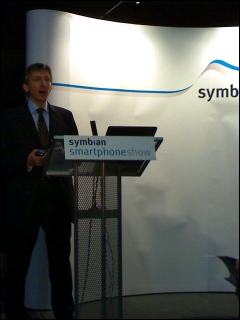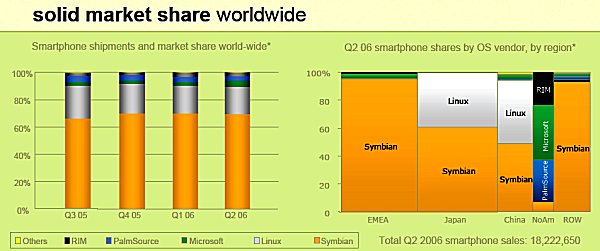 I've taken a week or so before looking back on the Symbian Smartphone Show, and have realised that the lack of big news to hang a report on is actually the news. The pockets of journalists asking each other 'what's the story' from the floor shows that we were expecting the traditional keynote with huge announcements and flag waving (after all, LG becoming a Symbian Partner, a new design from Samsung that really will reach the shops this time, the rocky but ultimately successful launch of Symbian OS 9.1…)
I've taken a week or so before looking back on the Symbian Smartphone Show, and have realised that the lack of big news to hang a report on is actually the news. The pockets of journalists asking each other 'what's the story' from the floor shows that we were expecting the traditional keynote with huge announcements and flag waving (after all, LG becoming a Symbian Partner, a new design from Samsung that really will reach the shops this time, the rocky but ultimately successful launch of Symbian OS 9.1…) It didn't happen that way. CEO Nigel Clifford reflected on Symbian's philosophy in the classic under promising and over delivering style that service companies strive for. Sauntering out to present the keynote he brought forth a picture of the Symbian lifestyle, and hit most of the points mentioned above, but in a very reserved way. Blink and you'd miss the reference to 'new handsets from partners LG and Samsung'. Security became 'four out of five of the top handset manufacturers now have 9.1 devices'.
How very British. How very Symbian.
Everyone realises that Nokia has the majority of sales of Symbian OS, and industry watchers often portray this as a very bad thing. Which in a dog-eat-dog competitive world, it would be, but Symbian and its partners just do not work like that. While there may not be a million handset manufacturers out there, the long tail concept of selling is something that must be back in the mind of all the partners. And you don't see Nokia steaming in and dominating everything – witness their purchase of the Codewarrior tool. Now metamorphosised into Carbide C++, it is used not only to compile the core OS, but as the SDK for all the User Interface, not just for Nokia's S60 platform. While there are areas of revenue where partners are in competition, there are other areas (such as Carbide) where everyone is working together as a team to increase the value in the whole Symbian ecosystem.
Symbian, more than any other Operating System company, is a partnership of equals, and these partners are not just in the handset manufacturing business, but from every area that could provide benefit. A glance over the landscape sees new partners announced every month. There are consulting partners, there are partners providing training for developers, there are software companies… there's even a little web site called 'All About Symbian' in the program...
Symbian is acting as the perfect socialite – much like a host at an Ambassador's Dinner Party, it is introducing disparate people who really need to get along together, and in the process helping itself. For example, the US based network Cingular has recently signed on as a Symbian partner – the biggest US network now together with the biggest Smartphone Operating System? I wonder what Microsoft and Access/PalmSource think of that?

Of course the US Market has still not taken to Symbian OS (yet) for its smartphones, but there are signs (such as the above Cingular agreement) that a beachhead is in progress, and that the different market requirements are being considered. While power-users are obviously dismayed at the E61 having its Wi-Fi stripped out to make the E62 acceptable to US networks, bringing the rest of the benefits of 'the Symbian lifestyle' to the market is a vital step – and we all managed a long time without Wi-Fi in any case.
 There are dangers as well, and the keynote on second day from Symbian EVP David Wood dealt with this in the classical sense by portraying those dangers as mythological Horsemen of the Apocalypse (War [Competition both internal and external], Fire [laptops requiring so much power for CPU's and toys that batteries explode – so no pushing Symbian too fast], Floods [of data and information], Plague [be aware of malware and other security issues] and so on). All of these are planned for, and with a touch of stiff upper lip, I expect them to be taken in their stride.
There are dangers as well, and the keynote on second day from Symbian EVP David Wood dealt with this in the classical sense by portraying those dangers as mythological Horsemen of the Apocalypse (War [Competition both internal and external], Fire [laptops requiring so much power for CPU's and toys that batteries explode – so no pushing Symbian too fast], Floods [of data and information], Plague [be aware of malware and other security issues] and so on). All of these are planned for, and with a touch of stiff upper lip, I expect them to be taken in their stride.
Symbian's ecosystem, and the company itself, might be a little bit boring if you are not paying attention, but it is all happening. There's no imposition of news for arbitrary deadlines such as the Smartphone Show. There's a job that needs doing, so why bother shouting about a half completed plan?
Every week you hear how another OS is going to come up and get the market, how Symbian will fracture from within, and how one partner will break and run. It's not going to happen. There's an air of confidence around not only the management, but the staff inside Symbian. Call it determination, or quiet resolve, but they know they're going to be THE mobile Operating System.
And if you don't realise it yet, they're not going to sit you down and tell you. You'll work it out yourself in good time.
Ewan Spence, November 2006
